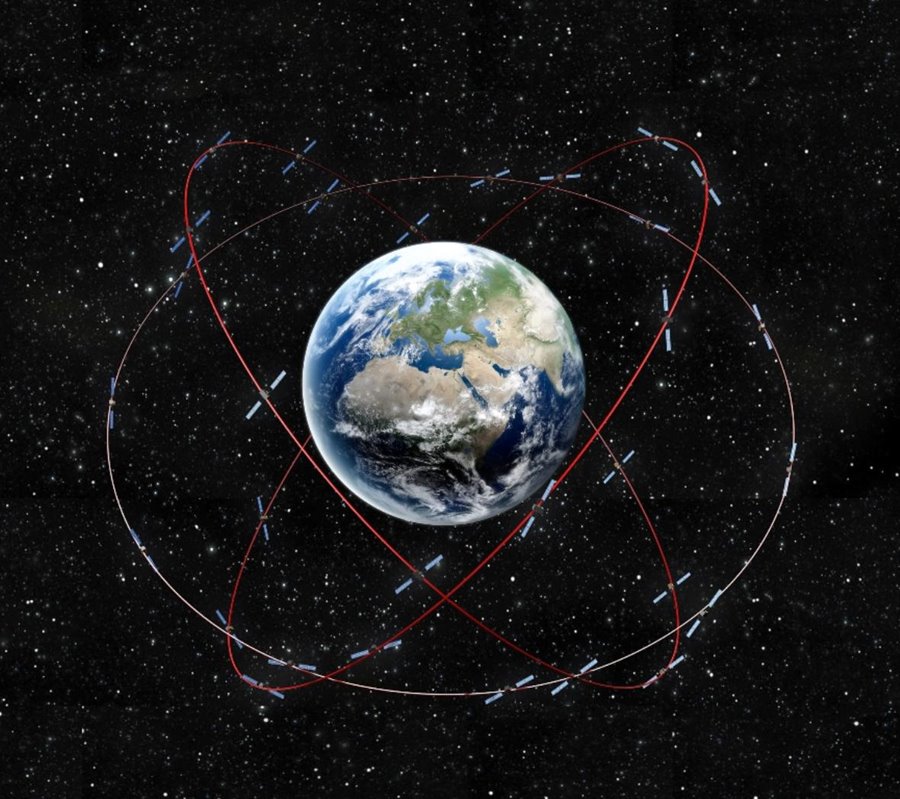
SSTL has been selected by ESA to supply 14 navigation payloads for the deployment phase of the Galileo satellite navigation system which was announced by the European Commission (EC) today, 7th January. SSTL is teamed with OHB–System of Bremen, Germany for the provision of these fully operational Galileo satellites. The two companies agreed to work together as a “core team” on Galileo at the end of 2007, with OHB taking the role of prime contractor and builder of the spacecraft “bus” and SSTL taking full responsibility for the navigation payloads onboard the satellite that will form the heart of the Galileo navigation system.
Each satellite will carry two different types of highly accurate atomic clocks which are used to generate navigation messages that are broadcast by the satellites directly to the users’ Galileo receivers. Under the contract, SSTL will be responsible for the design, manufacture and test of these navigation payloads using equipment procured mainly from European suppliers. SSTL will also manufacture some of the electronics to interface the satellite bus built by OHB-System and the navigation payload.
Commenting on the award SSTL Group CEO Dr Matt Perkins stated “The award of this contract is an important step for SSTL. Our satellites are already providing operational services for many government and commercial customers and we are pleased to have a major role within Europe’s flagship Galileo programme. The experience gained on GIOVE-A will help us to ensure the contract will be a success for the EC and ESA. This programme will also help to establish SSTL as a provider of communications and navigation satellites into other markets.”
SSTL’s Executive Chairman, Sir Martin Sweeting, added “This award is great news for the UK space industry and once again confirms SSTL as a world leader in sophisticated satellites and payloads, building on its 25-year history pioneering small satellites with 34 already launched, truly changing the economics of space”.
SSTL’s pioneering work as prime contractor for the GIOVE A satellite and in testing the Galileo signals will prove invaluable for the execution of this contract. GIOVE-A was the first part of the in-orbit validation programme for Galileo, broadcasting the first signal to successfully secure the critical Galileo frequency filing with the International Telecommunications Union (ITU) at 17:25 GMT on the 12th January 2006. On the 2nd May 2007 GIOVE-A successfully transmitted the first Galileo navigation message from space, containing the information needed by users' receivers to calculate their position. GIOVE-A was required to work for 27 months and has greatly exceeded this – it is now in its fifth year of operations and continues to perform well.
The first Galileo satellites produced under this contract will be launched from 2013. To help improve the overall schedule the team was authorised by the EC and ESA to initiate the procurement of long lead items for the full system during 2009 which will enable the team to make a quick start towards an operational Galileo constellation.
About SSTL
Surrey Satellite Technology Limited (SSTL) is the world's leading small satellite company, delivering operational space missions for a range of applications including Earth observation, science and communications. The Company designs, manufactures and operates high performance satellites and ground systems for a fraction of the price normally associated with space missions, with 300 staff working on turnkey satellite platforms, space-proven satellite subsystems and optical instruments.
Since 1981 SSTL has launched 34 satellites as well as providing training and development programmes, consultancy services, and mission studies for ESA, NASA and commercial customers, with its innovative approach that is changing the economics of space.
Based in Guildford, UK, SSTL is owned by EADS Astrium NV.
www.sstl.co.uk
About Galileo
Galileo is a joint initiative of the European Commission (EC) and the European Space Agency (ESA).
Galileo will be Europe’s own global navigation satellite system, providing a highly accurate, guaranteed global positioning service under civilian control. It will be inter-operable with GPS and GLONASS, the two other global satellite navigation systems.
A user will be able to take a position with the same receiver from any of the satellites in any combination. By offering dual frequencies as standard, however, Galileo will deliver real-time positioning accuracy down to the metre range, which is unprecedented for a publicly available system.
It will guarantee availability of the service under all but the most extreme circumstances and will inform users within seconds of a failure of any satellite. This will make it suitable for applications where safety is crucial, such as running trains, guiding cars and landing aircraft.